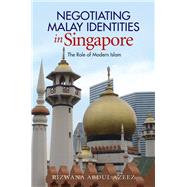Negotiating Malay Identities in Singapore The Role of Modern Islam
, by Abdul Azeez, Rizwana- ISBN: 9781845196967 | 1845196961
- Cover: Hardcover
- Copyright: 3/1/2016
Singapore Malays subscribe to mostly traditional rather than modern interpretations of Islam. Singapore state officials, however, wish to curb the challenges such interpretations bring to the country's political, social, educational and economic domains. Thus, these officials launched a programme to socially engineer modern Muslim identities amongst Singapore Malays in 2003, which is ongoing. Negotiating Muslim Identities documents a variety of ethnographic encounters that point to the power struggles surrounding two basic and very different ways of living. While the Singapore state has gained some successes for its project, it has also faced significant and multiple setbacks. Amongst them, state officials have had to contend with traditional Islamic authority that Malay elders carry and who cannot be ignored because these elders are time-entrenched authority figures in their community. One of the book's significant contributions is that it documents how Singapore, an avowedly secular state, has now turned to Islam as a tool for governance. Just as significant are the insights the study provides on another aspect of Singapore state governance, one usually described as 'authoritarian'. The book demonstrates that even 'authoritarian' states can face serious obstacles in the face of religion's influence over its followers. The academic literature on Singapore Malays is sparse: this work not only fills gaps in the existing academic literature but provides new and original research data. Its data-rich ethnographic and anthropological approach show the complexities of Malay and Muslim social contexts, and complements other works that examine Southeast Asian states ' management of Islam, which has attracted much scholarship given the global interest in Islam-based politics and social organisation.







